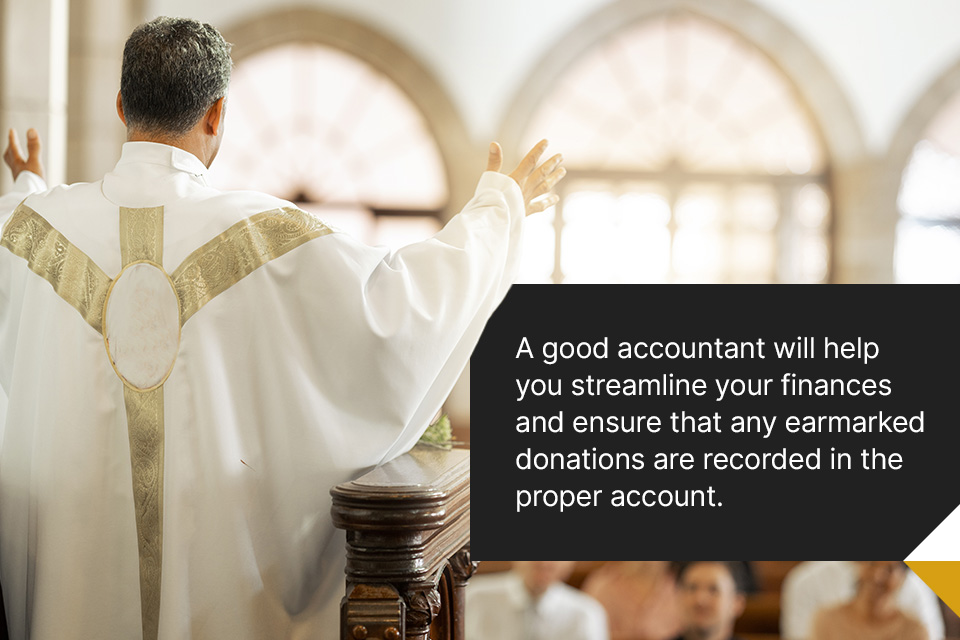Do Churches Need Accountants?

The world of church accounting is vastly different from accounting for for-profit entities. Religious organizations face many unique challenges, such as restricted donations, differences in financial reports and payroll for ordained ministers. Churches may opt to try to handle this in-house, but below you’ll find several reasons why it may be helpful to get an accountant for your faith-based organization.
What Is Church Accounting?
Church accounting includes documenting expenses, monitoring offerings, and overseeing expenditures for projects and activities. The primary focus is not on generating profit but supporting the congregation and society’s members through accountable financial management practices. This is why accountability is the cornerstone of their accounting approach.
As nonprofits, churches must use fund accounting to monitor income and expenditures. Fund accounting enables churches to categorize revenue and expenses according to their sources and purposes. Essentially, fund accounting is the recommended accounting type for churches.
A church’s chart of accounts typically falls under these categories:
- Assets: Comprises everything a church owns.
- Liabilities: Includes everything a church owes.
- Equity: Covers a church’s net assets.
- Income: Includes all donations and revenue.
- Expenses: Outlines a church’s running costs.
Common Accounting Mistakes Churches Make
Finances are essential to the smooth running of a church, and accounting, when done right, helps the church do ministry in ways that are trustworthy and profitable to the body. However, accounting mistakes can lead to legal troubles and financial losses.
Some common mistakes that churches make with their accounting include:
- Incorrect classification of funds: Like for-profit organizations, churches should classify and allocate funds accurately. Failure to do so can lead to irregularities and, worse, misappropriation.
- Poor record keeping: The law requires churches to keep books and records to show compliance with tax rules. Without clear accounting systems and strategies, mistakes in financial recordkeeping are almost inevitable.
- Inaccurate or missed filings: Although the law exempts churches from paying taxes, the church is still legally obligated to pay taxes under exceptional circumstances, such as operating a business unrelated to its tax-exempt status. Overlooking such a filing can potentially lead to a church tax inquiry.
Benefits of Outsourcing Accounting for Churches
Proper accounting for churches has several benefits, especially when experienced accountants do it. These benefits include:
1. Experience and Expertise
Accounting mistakes can cost the church its money, reputation and legal standing. However, with proper accounting services, accounting compliance becomes easier for faith-based organizations. Churches can leverage the experience and expertise of accountants who understand the requirements of accurate bookkeeping and financial records, proper fund classification, and appropriate tax filings where necessary.
2. Compliance With Best Practices
Experienced accountants know the ins and outs of accounting best practices that a non-accountant may not know. Due to the strict standards of the IRS for churches, it’s in a church’s best interest to hire an accountant familiar with church accounting guidelines and general accounting standards. A good example of such an accounting standard is the Generally Accepted Accounting Principles (GAAP), which includes:
- Principle of Regularity
- Principle of Consistency
- Principle of Sincerity
- Principle of Permanence of Methods
- Principle of Non-Compensation
- Principle of Prudence
- Principle of Continuity
- Principle of Periodicity
3. Maintaining Designated Funds
Many faith-based organizations manage multiple funds, including general operating funds, restricted funds, and special project funds. These donations have donor-imposed restrictions and can only be used for one specific purpose. Designated or restricted funds can be problematic for several reasons.
Sometimes churches may have thousands of dollars in a fund, but regular funds may be down, and they are tight on money for regular operations. Restricted funds can also cause much confusion among pastors and ministry leaders regarding their intended purpose. Church accounting also requires extra attention and care, as restricted donations must go to the proper account, not a general fund.

Hiring an accountant may be a wise choice to manage designated giving. A good accountant will help you streamline your finances and ensure that any earmarked donations are recorded in the proper account. An accountant would allow churches to always see how much money is in all funds and ensure it is spent accordingly.
4. Budgeting and Financial Planning
Effective budgeting and financial planning are essential for the long-term sustainability of faith-based organizations. With our expertise in financial analysis and strategic guidance, we can help you develop comprehensive budgets, analyze financial data, and create a roadmap for achieving your organization’s goals.
How are the financial processes at your church? Are the books reconciled? When was the last time you saw a freshly prepared set of financials? Where is the money being spent? These are the important questions every church should be able to answer without hesitation. It is of utmost importance that the church’s finances be organized to maintain fiscal viability and invest wisely in its mission. Proper financial management will help your church leadership make wise decisions and push your church’s mission forward.
5. Save Time
All too often in church accounting, ministry leaders take time away from what really matters to focus on record-keeping. Church leaders can spend countless hours tracking incoming donations, funds, vendor invoices and bills, and other finances. Hiring an efficient and experienced professional in church accounting will free you up for what matters.
6. Legal Compliance
Churches and faith-based organizations may face more scrutiny than other businesses because of their tax-exempt status. There are regulations, standards and legislation that affect churches, and accountants must stay up to date on them. It can be quite a challenge to keep up with these changes, especially during a pandemic when everything seems to be moving at a dizzying rate. Hiring an accountant will take all the daily accounting work and compliance research off you and put it in the hands of a professional. You’ll have a weight lifted and more time to devote to ministry.
8. Donor Trust and Transparency
Churches invest much time, effort and resources to build donor trust. Such trust is hard to earn and easy to lose. Even the slightest accounting error can cause donors to lose faith in a church and their ability to use contributions responsibly. One of the benefits of churches outsourcing accounting to professional accountants is that they help maintain donor trust through accurate and transparent financial recordkeeping.
9. Expertise in Accounting Software
With several new and emerging accounting software programs and systems on the market, it may be daunting for churches to keep up, forcing them to continue using outdated and incompatible software systems. An experienced accountant stays up-to-date with technological advancements in accounting and can bridge the gap between technological challenges and your organization’s needs. Beyond introducing new and better systems, professional accountants have experience revamping outdated systems and integrating diverse software platforms.
How Marshall Jones Can Help Your Organization
Marshall Jones can assist your faith-based organization through outsourced accounting services, providing reliable and efficient financial management solutions. With our expertise and commitment to the unique needs of faith-based organizations, we offer the following benefits:
- Streamlined financial processes: We streamline financial processes by handling various accounting tasks, including bookkeeping, accounts payable and receivable, payroll processing and financial statement preparation. This allows faith-based organizations to focus on their core mission and activities.
- Compliance with regulatory requirements: Our team stays up-to-date with the latest regulatory requirements and tax laws applicable to faith-based organizations. We ensure compliance with reporting obligations, tax filings and other financial regulatory standards.
- Transparency and accountability: We help maintain transparency and accountability by implementing robust financial controls and practices. Our outsourced accounting services provide accurate and timely financial reports, ensuring transparency in the use of funds and facilitating donor trust.
- Strategic financial planning: We work closely with faith-based organizations to develop strategic financial plans, budgets and forecasts. Our team provides valuable guidance to help optimize financial resources, make informed decisions and support long-term sustainability.
- Cost savings and efficiency: Outsourcing accounting services to Marshall Jones eliminates the need for in-house accounting staff, reducing staffing costs, employee benefits and training expenses. This allows faith-based organizations to allocate resources more effectively toward their mission.
- Expertise and experience: Our team of skilled accountants and advisors brings extensive experience in working with faith-based organizations. We understand their unique financial and operational challenges and provide tailored solutions to address their specific needs.

Contact a Church Accounting Professional at Marshall Jones
With our offices in Atlanta and Alpharetta, GA, we are well-positioned to provide tailored accounting services to faith-based organizations in the area. Let us handle your accounting needs, so you can focus on what matters most — serving your community and fulfilling your organization’s mission. Contact us today to schedule a consultation and discover how our faith-based accounting services can support your organization’s financial success.
Links:
- https://marshalljones.com/industries/non-profits/
- https://marshalljones.com/differences-between-for-profit-and-nonprofit-accounting/
- https://marshalljones.com/industries/non-profits/
- https://www.irs.gov/charities-non-profits/eo-operational-requirements-recordkeeping-requirements-for-exempt-organizations
- https://www.congress.gov/crs-product/IF12509
- https://www.irs.gov/charities-non-profits/churches-religious-organizations/church-audits-reasonable-belief-requirement
- https://www.ojp.gov/sites/g/files/xyckuh241/files/media/document/GAAP_Guide_Sheet_508.pdf
- https://marshalljones.com/services/outsourced-accounting-services/
- https://marshalljones.com/understanding-the-importance-of-accounting-in-the-nonprofit-sector/
- https://marshalljones.com/contact/
